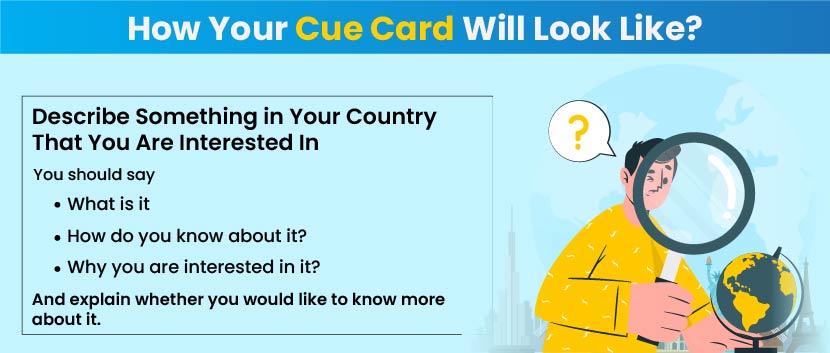The IELTS Speaking test evaluates a candidate's ability to communicate effectively on various topics. One of the common questions in Part 2 of the exam is to describe something in your country that you are interested in. This question allows you to showcase your fluency, vocabulary, and coherence while speaking for 1-2 minutes. In this blog, we will explore how to answer this question effectively and provide sample responses to help you prepare.

Table of Contents
The cue card is one of the most important part of the IELTS speaking section, where you get a cue card with a situation or a topic that you have to describe in your own words by speaking on it for 2 minutes. Moreover, you will get a minute to prepare your response and 2 minutes to speak about it. So, let us now understand the right way to answer a cue card.
The cue card is a medium by which the examiner checks your fluency in the English language. So, you must practice your speaking skills to be fluent in the exam. Moreover, it also checks your ability to think on a topic and how you present it in front of the examiner. Also, when you start speaking, always keep in mind to introduce the topic first and then continue with the response. Also, you will get a minute to prepare your answer. So, use that time to write the main keywords and sequence the points you will be speaking about. By doing this, you will stay on track and also be able to keep the examiner engaged. So, to understand the correct way of answering a cue card, let us discuss the topic ‘Describe something in your country that you are interested in’ with the sample answers and follow-up questions.
You can use the following pointers in your response:
And explain whether you would like to know more about it.
Now, look how your IELTS cue cards will look in the exam.
In this blog, you will find 3 samples of the topic ‘Describe something in your country that you are interested in’ with possible follow-up questions based on your response.
Here is the first example of the cue card. You can use the structure and tone of the response to score well in the IELTS exam.
India has a very rich heritage in its environment. I feel amazed when I try to explore India more. The folk dances, paintings, and instruments are a few of the things that hold the heart of India's culture.
I was introduced to Indian culture when my parents took me to a Rajasthani dance festival. The music, dance, performances, and performers' dresses dumbfounded me, motivating me to explore more about India's heritage.
Moreover, the emotions and expressions of the dancers, the variety of painting styles, and the colourful dresses in every part of India catch my engrossment. Also, the way of presenting any art, whether it is a dance of an act or a painting, is so good that it is hard for me to keep my attention away from these things.
I would definitely love to explore more of it because India is such a diversified country that it is almost unattainable for a human to know everything about it. The language here changes every 100 km, making this country the most interesting place that people like me would always explore more and more.
Thus, I feel proud that I live in a country where its heritage and culture can captivate the maximum number of tourists worldwide.
Here is another sample response of the cue card. This will help you with variations in the cue card response
India is known for its variety of religious festivals. This makes India one of the most diverse and secular countries, as people of every religion congregate to celebrate each other's festivals with complete joy.
I live in a society with over 2000 residents from different parts of India. We all come together in the community garden to celebrate all the festivals throughout the year. The air is filled with joy and enthusiasm as we partake in the festivities, regardless of the religion being celebrated. Our society organizes a communal lunch or dinner on that day, and people sing and dance, adding to the jubilant atmosphere.
This interests me because India is a country with the most diverse religions in the world. We can also see that there are multiple crusades going on in the world. So, to eschew such a situation and bring people together with peace and harmony, it is important that we all come together and become a part of each other's celebrations.
There are many small and major festivals in India that are not known to many people. So, I would love to know about them and their practices. I want more people to participate in this, as it will promote peace in the country. It is well said that the unity of the population is a nation's biggest strength.
So, the festivals in India fascinate me, and I am interested in learning more about them, as this will promote secularism in my society and nation.
This is the last sample response of the cue card. By these 3 samples, you will learn that how you can do variations in the responses.
India is known for its traditional music. For me, it is a very intriguing activity to be a part of, not as a performer but audience for sure. The traditional and folk music of India is always the most interesting part of the Indian heritage.
My father is a great fan of Indian folk music and he used to take me to multiple events. From there, I also became fond of classical and traditional music. After that, I used to listen to some specific folk music on YouTube and this made a huge impact on me so I started researching it.
The biggest reason that I am interested in listening to the traditional and folk music of India is because of the instruments used in it and the taste of every region of the country they serve while performing. I feel astonished by the way they explain the history and culture of India and the states or regions in the form of music. Moreover, the dance performance people give on the music is a cherry on top.
I will be more than happy to explore more genres because by this, I will get to learn more about the history and culture of the place and also this will broaden my insight. Moreover, because I am now a huge fan of folk music, it will be a joyful experience for me to explore more art forms like this.
So, these were the reasons that I am attracted to the traditional folk music of India. They can be the best source of information for people to get insight into the place where the music belongs.
So, these were the samples of the cue card ‘describe something in your country that you are interested in’. You can follow the tone of the response to score well in IELTS speaking part 2. Now, you will go through the hard words that were used in these samples, which are known as lexical resources.
While submitting your response, it is important to use advanced vocabulary for IELTS to impress the examiner. Thus, the table below shows some of the advanced words used in the IELTS cue card sample above.
| Words | Meanings |
| Dumbfounded | Very surprised |
| Engrossment | A feeling of great interest that makes you give something all of your attention |
| Unattainable | Not able to be reached or achieved. |
| Captivate | To attract and hold somebody’s attention |
| Congregate | To come together in a crowd or group |
| Crusades | A fight for something that you believe to be good or against something that you believe to be bad |
| Eschew | Abstain from. |
| Reams | A large quantity of something |
| Fascinating | To attract or interest somebody very much |
| Intriguing | To make somebody very interested and wanting to know more |
| Astonished | To surprise somebody very much |
| Insight | A deep understanding of what somebody/something is like |
These were the advanced vocabulary used in the samples. You can use the same words in your response to make a positive impression on the examiner.
These were the advanced vocabulary used in the samples. You can use the same words in your response to make a positive impression on the examiner.
Once you finish the IELTS speaking part 2, the examiner will ask you the follow-up questions based on your response to the topic. Thus, you must know what you said in your response and be ready for the cross-questioning. Moreover, the total time for this activity is around 4-5 minutes.
Thus, the below mentioned are some of the possible follow-up questions that the examiner can ask you.
Now that you are completely aware of what the cue card is and how to answer it, let us discuss some of the tips that will improve your score in the IELTS exam.
The IELTS exam needs extra effort and regular practice to score well. Moreover, there are a few other tips that will help you overall.
So, these are some of the tips that will help you achieve good marks in the IELTS exam. Moreover, these tips will make this exam easy for you. Therefore, let us conclude this blog here.
To conclude, it is recommended that you put some of the extra effort in the IELTS speaking section. This will help you clear the exam with the desired score on the first attempt. Thus, if you go through the samples and the tips mentioned above, understand the tone of response, and follow these tips, you will fulfill your dream of studying abroad as early as possible. Moreover, if you still face any issues during your preparations, you can opt for our offline and online IELTS classes, where the experts will help you in the preparation process until you succeed.

We are available in :
BangaloreAhmedabadJaipurHyderabadKeralaPuneChandigarhMumbaiGurgaonChennaiKolkataTrivandrumNoidaKochiCalicutKottayamKollamThrissurIndoreUdaipurdisclaimer:logos and other registered trademarks of universities used on this platform are held by their respective owners. Gradding does not claim ownership or association on them, and their use is purely for informational and illustrative purposes.





